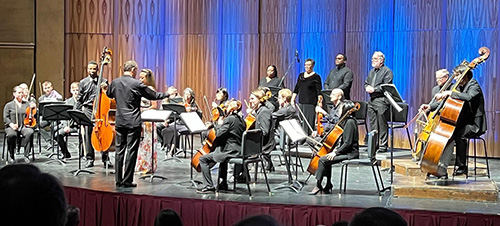by Kevin McLaughlin

The concert, titled “Serenade for Strings,” featured six chamber works, all performed on the ASO’s home stage at E.J. Thomas Hall. The players were seated in front of a scrim to enhance projection and simulate a chamber setting. The program included J.S. Bach’s Brandenburg Concerto No. 3, Julia Perry’s introspective Pastoral, and Xavier Foley’s Double Concerto “For Justice and Peace,” written in 2019. Also a double bassist, Foley was featured twice as soloist — first, alongside violinist Eunice Kim in the Double Concerto and following intermission, in Bottesini’s Double Bass Concerto No. 2. The evening concluded with a deft performance of Tchaikovsky’s intimate Serenade for Strings.
The ensemble began the concert sans conductor, with only eleven members onstage. Emphasizing the chamber character of the Brandenburg, the players maintained a tight tonal and rhythmic blend throughout, thanks in large part to the leadership of concertmaster Tallie Brunfelt. The succession of solos was seamless and nicely matched. Harpsichordist Robert Mollard offered a tasteful interpolation for the second movement, expanding on Bach’s brief pair of chords and making a satisfying bridge between the outer movements. The final dance was fleet and sparkling.
Principal flute Barbara O’Brien played the lyrical solos in Pastoral, a work for flute and string sextet by Akron’s own Julia Perry. Mired in legal protection and largely unknown, the works of Perry are performed much too rarely. Thus, the concerted efforts by music director Christopher Wilkins and the ASO to help right this wrong (having performed two other works this season), are doubly appreciated. Pastoral is a jewel, and was given its due by Wilkins and the ensemble.
Xavier Foley is a formidable talent. He plays his instrument, often an ungainly opponent, with the effortlessness of a true virtuoso. His own Double Concerto for double bass, violin, chorus, and strings reveals further wellsprings of talent as a composer.
The piece marks the 400th anniversary of the arrival of the slave ship White Lion in Jamestown, Virginia. Theatrical elements, such as a gavel struck on a wooden box in unexpected moments and the presence of a small chorus representing the singing of enslaved persons, were extremely effective. Eunice Kim aided the cause of the music with an effortless rendering of the solo violin part.
Foley undertook the solo role in the Bottesini with equal aplomb. Tall, with an upright, commanding posture — he is nearly as tall as the instrument itself — Foley’s dexterous French bow technique, agile leaps, accurate landings, and evident display of finger strength all characterized him as a masterful performer with a playful touch.
The Tchaikovsky Serenade for Strings provided a unifying title for the concert and a satisfying closer. The strings played with an appealing blend, though at times, from where I was sitting, the cellos could have used a notch or two more volume. The Waltz was charming, and the second movement Elegie was particularly poignant, especially in the gossamer pianissimo leading to the rousing Russian-dance Finale.
One curmudgeonly complaint: it was stifling in the balcony, only slightly relieved by the temporary opening of the doors during intermission. Could the heat be turned down a little?
Published on ClevelandClassical.com January 18, 2023.
Click here for a printable copy of this article



